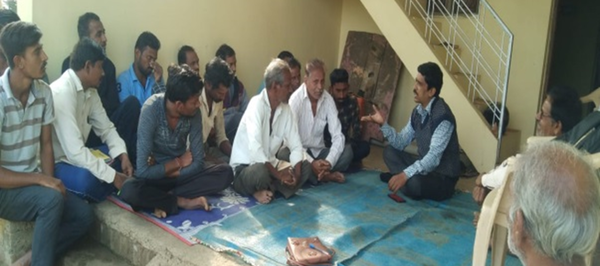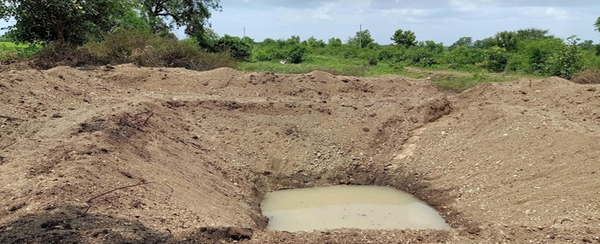“With the farm pond on my land, the moisture in my soil is maintained at optimum levels even in the short dry periods. This saved me money by avoiding additional irrigation that I used to give normally every year.”
Cotton demand is rising due to a growing worldwide population and a surge in shopping behavior. Worldwide production has to increase to keep up with demand. India is one of the main producers of cotton thanks to climate and soil conditions. However, inefficient water use behavior, technologies and practices, and fluctuating prices drive cotton farmers to despair. TU Delft is collaborating with NGO Solidaridad Asia to improve their resilience.
From farmer debts, droughts and low profits towards sustainable livelihoods
One of the major cotton producing regions is Maharashtra, located in the western peninsular region of India and part of the Deccan Plateau. The cotton yield and profit in Maharashtra is, however, low compared to other regions due to inefficient water use - due behaviour and the available technologies-, lack of water storage for irrigation and the increasing droughts in the area. Varying cotton prices over the years also means volatile incomes for the farmers.
Non-governmental organisation Solidaridad Asia (SNAL) stepped in and created a project for the region, called ‘Water Efficiency in Sustainable Cotton-based Production systems in Maharasthra, India’. During this 5-year project SNAL aims to increase the farmers' profits from cotton cultivation by improving water, crop and fertilizer usage.

Farmers receiving training
Identifying bottlenecks and building reservoirs
TU Delft’s department of water management is collaborating with SNAL to reach these goals. TU Delft brings knowledge of sociohydrology - the science of people and water, and water management practices into the project. With these methods, efficient water use, technologies and management practices can be delivered and knowledge on the relation between behaviour and costs of farmers gained. On the other hand, TU Delft gains more knowledge on farming behaviour and current water usage, and delivers societal impacts based on world class research.
The project is set up around different phases. The first phase took place in the summer of 2019 where an MDP group along with SNAL conducted a baseline to identify the main bottlenecks and areas to tackle first (called hotspots). The hotspots identified are used in phase two as case study areas. In phase two a model for reservoir identification is tested and a sociohydrological model is further developed and tested. In the meantime the ground staff in India construct reservoirs, implement new technologies and best practices, carry out field visits and assess the impacts of these intervention in collaboration with TU Delft. The main goal of phase two is to and gain knowledge on current costs and behavioural aspects for sustained uptake of the interventions. Phase two is still ongoing. 60 Reservoirs are already finished and the farmers have received training on the management of the structures.

The farm pond of mr. Maroti
An example for future projects
One of the farmers connected to the project is Maroti Atram. He has been cultivating cotton and soybean for many years. During the lockdown of last year he participated regularly in periodic training sessions on ‘good agricultural practices and water saving methods’. When the restrictions were eased, a pond was constructed on his land. “With the farm pond on my land, the moisture in my soil is maintained at optimum levels even in the short dry periods. This saved me money by avoiding additional irrigation that I used to give normally every year.” Our local weather station installed in one of the demonstration plots calculated a total of 517mm of rainfall in the region, and Mr. Maroti’s farm pond was able to harvest a total of 156,000 litres of rainwater. Through seepage losses, the farm pond also eliminated the requirement of irrigation in the drier period from September.
SNAL’s practical knowledge combined with the technical and scientific knowledge of TU Delft created valuable results and insights in a project that serves as an example for other projects and one for future researchers to keep an eye on. It has proven that students and staff of TU Delft are capable of thinking outside of the box and collaborate in projects to deliver sustainable impacts based on rigorous science.

